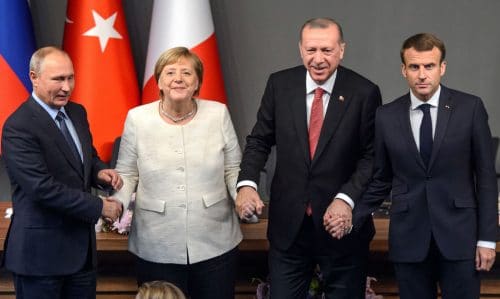Will a Multipolar World Be Trump’s Legacy?

PARIS — It’s obvious that U.S. President Donald Trump’s interests closely adhere to those of his favorite programs on Fox News. I should know — I used to co-host a Fox News show.
When I asked at one point why we weren’t discussing the Iraq war on air, a senior Fox executive told me that it depressed viewers because it wasn’t exactly a success story. So did history, apparently. Former Fox News chief Roger Ailes, who died in 2017, once asked that I never again mention the Peace of Westphalia on the show.
While Trump has access to the kind of global intelligence many of us can only dream about, his Twitter rants suggest that he has a penchant for the kind of domestic issues that Fox fire-hoses out to its audience on a daily basis. But Trump’s disinterest in global affairs and his focus on making America great again might actually improve the entire world.
Over the weekend, two Western leaders (French President Emmanuel Macron and German Chancellor Angela Merkel), Russia’s leader (President Vladimir Putin) and the leader of the country representing a bridge between the eastern and western spheres (Turkish President Recep Tayyip Erdogan) met in Istanbul to hash out plans for post-conflict Syria. When they emerged, they awkwardly held hands for a photo. U.S. representation was nowhere to be found.
When was the last time America wasn’t involved in a foreign country’s postwar plans — particularly when the U.S. played a key role in inciting that conflict in the first place?
And while there’s a low-key debate going on in America about whether to leave Afghanistan after 17 years of military intervention, one gets the impression that Trump’s interest in the war is directly proportional to its coverage on “Fox & Friends” — meaning relatively minimal. This doesn’t mean that the conflict isn’t being resolved. As with the Syrian conflict, it’s just moving ahead through a more multipolar approach involving other countries.
The solutions in Syria and Afghanistan are political rather than military anyway. The lack of a clear military objective and the constant moving of goalposts is exactly why American allies long ago looked at their watches and realized that it was time for their troops to bail out.
While America is trying to bring various parties in the Afghan conflict to the table, those efforts are undermined by a historical lack of trust in the U.S. as an honest broker. That’s where the Shanghai Cooperation Organization comes in. Spearheaded by China and Russia, and focused on security, counterterrorism and economic growth, the SCO admitted Pakistan and India as full members last year. And it’s through a grand bargain with Pakistan (which backs the Taliban) that progress could very well be made in Afghanistan.
America has a part to play, too. It’s just not the only part, or even the lead role.
Trump’s national security adviser, John Bolton, an interventionist hawk, seems to be echoing this sentiment — whether or not he realizes it. In an interview with Reuters last week after a visit to Moscow, Bolton said that the United States wants to hold strategic talks with Russia about what Reuters described as “China’s belligerent activity.”
The notion that America would need Russia to help contain China is such a foreign concept to the Washington establishment that the Reuters interview prompted a reaction on Twitter from Obama-era Russian Ambassador Michael McFaul: “Oh for heavens [sic] sake.”
During Bolton’s meeting with Putin last week, the Russian president made a joke about U.S. hostility, according to the Russian news service RT.
“As far as I remember,” Putin reportedly said, “the U.S. coat of arms features a bald eagle that holds 13 arrows in one talon and an olive branch in another, which is a symbol of a peace-loving policy. I have a question. Looks like your eagle has already eaten all the olives; are the arrows all that is left?”
“But I didn’t bring any more olives,” Bolton replied.
“That’s what I thought,” Putin said.
Maybe Putin can find some olive branches for Bolton — perhaps in relation to Bolton’s favorite obsession, Iran. Unlike Bolton, the average American doesn’t want war with Iran. Nor can the U.S. afford to start another conflict in the Middle East when it hasn’t been able to resolve all of the conflicts that Bolton and his hawkish pals started. Still, Russia is such a close Iranian ally that if there are some cards that Bolton wants to play in an attempt to score some concessions from Iran, then Russia could certainly find a way to deal him into the game.
It seems that putting America first means sitting in the back seat watching “Fox & Friends” while letting other nations take the wheel in global affairs. But if that’s what it takes to arrive at the final destination without driving off the road somewhere in the Middle East, so be it.
—
Rachel Marsden is a columnist, political strategist and former Fox News host based in Paris. She is the host of the syndicated talk show “UNREDACTED with Rachel Marsden” Tuesdays at 7 p.m. Eastern: http://www.unredactedshow.com. Her website can be found at www.rachelmarsden.com.
—
© 2018 Tribune Content Agency, LLC.























